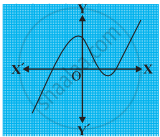Advertisements
Advertisements
Question
Find the sum of the zeros and the product of zeros of a quadratic polynomial, are `−1/2` and \ -3 respectively. Write the polynomial.
Solution
We can find the quadratic polynomial if we know the sum of the roots and product of the roots by using the formula
`x^2` – (sum of the zeroes)x + product of zeroes
We can find the quadratic polynomial if we know the sum of the roots and product of the roots by using the formula
`x^2 `– (sum of the zeroes)x + product of zeroes
`⇒ x^2-(-1/2)x+(-3)`
`⇒x^2+1/2x-3`
Hence, the required polynomial is `x^2+1/2x-3`
APPEARS IN
RELATED QUESTIONS
The graphs of y = p(x) are given in following figure, for some polynomials p(x). Find the number of zeroes of p(x).

Find all the zeroes of polynomial `(2x^4 – 11x^3 + 7x^2 + 13x – 7)`, it being given that two of its zeroes are `(3 + sqrt2) and (3 – sqrt2)`.
Find the value of k such that the polynomial x2 − (k + 6)x + 2(2k −1) has sum of its zeros equal to half of their product.
If one of the zeroes of the quadratic polynomial (k – 1) x2 + kx + 1 is - 3, then the value of k is ______.
If one of the zeroes of the cubic polynomial x3 + ax2 + bx + c is -1, then the product of the
other two zeroes is ______.
If the zeroes of the quadratic polynomial ax² + bx + c, c # 0 are equal, then ______.
If one of the zeroes of the quadratic polynomial (k -1)x² + kx + 1 the value of k is ______.
If the zeroes of the quadratic polynomial ax2 + bx + c, c ≠ 0 are equal, then ______.
The number of polynomials having zeroes – 3 and 4 is ______.
The zeroes of the quadratic polynomial 16x2 – 9 are ______.
